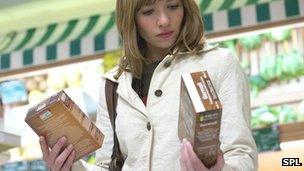Hungry shoppers 'buy more calories'
- Published

Avoid going to the supermarket when you're very hungry, as you're more likely to buy unhealthy food like crisps and sweets.
That's the health message of US researchers, who have looked at whether fasting has an impact on food choices.
In an experiment, people who fasted for five hours before shopping tended to buy higher-calorie food than when full.
The study has health implications, given the rise in extreme dieting, says a Cornell University team.
Past research has suggested, perhaps not surprisingly, that people buy and eat more food when they have been fasting or dieting.
However, the Cornell scientists wanted to find out whether fasting affected what people buy, as well as how much.
They devised an experiment in which 68 paid participants were asked to avoid eating for five hours, then shop online in a simulated grocery store for high calorie and low calorie foods, including dairy products, snacks and meat.
Each high calorie item (including sweets, crisps and red meat) was displayed alongside a similar low calorie item (such as fruit, vegetables and chicken breasts), but prices were not included.
In half of the sessions, participants were first given a plate of crackers to eat until they no longer felt hungry.
Shift in choices
In a second study, people were tracked while they shopped in a supermarket, either after lunch, when they were full, or before supper, when they were hungry.
The results showed that hungry people chose a higher number of high calorie foods but there was little difference in the total number of food products selected.
In other words, people who shop when they are hungry buy fewer low calorie foods as a proportion of their food purchases but they don't buy more overall.
The study has public health connotations, because fasting, for religious reasons, to lose weight or due to busy lifestyles, is common, say Prof Brian Wansink and Dr Aner Tal.
"Even short-term food deprivation can lead to a shift in choices such that people choose less low-calorie, and relatively more high-calorie, food options," they report in the Journal of American Medicine Internal Medicine.
"Given the prevalence of short-term food deprivation, this has important health implications."
Prof Walsink says one of the key messages for consumers is that doing your weekly food shop on an empty stomach - perhaps late afternoon rather than early afternoon - can have a big impact on healthy eating.
"One decision to shop hungry pretty much messes you up for the rest of the week," he told BBC News.
"Any time you go shopping, make sure you grab an apple to eat on the way."